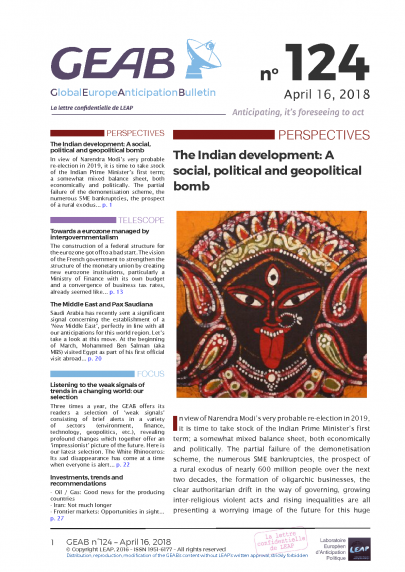GEAB 124
The construction of a federal structure for the eurozone got off to a bad start. The vision of the French government to strengthen the structure of the monetary union by creating new eurozone institutions, particularly a Ministry of Finance with its own budget and a convergence of business tax rates[1], already seemed like a somewhat limited ambition given what is at stake. That said, it was a first step towards building the infrastructure needed for the good functioning of the common currency.
Germany puts a brake on the eurozone’s federalisation
This little ambition appears to have been undermined already. In March, the unblocking of the German political situation, which was a pretext for maintaining the status quo, did not prove to be decisive at all. The European Council of 22nd March 2018 remained silent in its conclusions on this issue[2], even though it was meant to start work on it. On 10th March, the German weekly Der Spiegel announced that the German Federal Government was not ready to move on the issue[3]. Officially, this impossibility was connected to the length of negotiations between the partners of the Berlin ‘Grand Coalition’, but this excuse didn’t seem legitimate since European integration is officially one of the agreement points between SPD and CDU/CSU[4].
As a matter of fact, the new German ‘Grand Coalition’ government does not seem any more willing than its predecessor to support a ‘federalist’ reform of the eurozone to include supranational institutions. The German media has also confirmed that Chancellor Angela Merkel is not eager to make a ‘big step forward’ in this area[5]. The messages sent by the new Federal Minister of Finance, the Social Democrat Olaf Scholz, have been along these lines since his appointment. During his meeting with Bruno Le Maire, the French Minister of Economy and Finance, he made no commitments and the two men mostly agreed to differ…
As for the financial policy of the Grand Coalition,[6] it includes additional payments to Europe, of course, but for specific projects, especially those related to border defences. Each time, the federal coalition insists that these payments must depend on ‘conditions’[7]. Nothing is planned for the eurozone, but it seems evident that, once again, all ‘budgets’ will have to be controlled by Berlin and subject to conditions, among which will be respect for the current rules.
Login

In view of Narendra Modi's very probable re-election in 2019, it is time to take stock of the Indian Prime Minister's first term; a somewhat mixed balance sheet, both economically [...]
Saudi Arabia has recently sent a significant signal concerning the establishment of a ‘New Middle East’, perfectly in line with all our anticipations for this world region. Let’s take a [...]
Three times a year, the GEAB offers its readers a selection of ‘weak signals’ consisting of brief alerts in a variety of sectors (environment, finance, technology, geopolitics, etc.), revealing profound [...]
- Oil / Gas: Good news for the producing countries - Iran: Not much longer - Frontier markets: Opportunities in sight Oil / Gas: Good news for the producing countries [...]

Comments